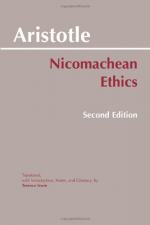|
This section contains 657 words (approx. 2 pages at 400 words per page) |

|
Perspective
Aristotle writes from the perspective of a person addressing an interested and attentive audience. He assumes his audience has a certain level of familiarity with his subject matter and with the Greek writers to which he refers. He is a teacher, and he speaks both to teach and to persuade.
Aristotle is not only addressing his students, but his colleagues as well. Once a teacher alongside Plato, Aristotle departs from Plato's philosophy at times, particularly in his ideas about the nature of happiness. He also aims to distinguish himself from other philosophers and philosophical schools of thought that would have been familiar to his audience, such as the ideas of Pythagoras and the complicated but ultimately empty words of the sophists. Aristotle seeks to establish his own ideas as building on those of his predecessors, but being unique from them.
Aristotle is a professional thinker, so it is...
|
This section contains 657 words (approx. 2 pages at 400 words per page) |

|




